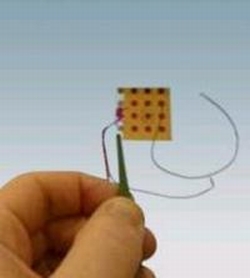
Researchers at Boston College have built a solar cell that successfully uses hot electrons to increase the cells’ power output. The ultra-thin solar cells get a power boost from high-energy photons. According to the research, this boost is an outcome of extracting hot electrons. The new cells could result in efficiencies as high as 67 percent, while its conventional counterparts are only about 35percent efficient.
Conventional solar cells are thicker, so when they absorb a higher-energy blue photon, it first produces a similarly high-energy electron, but it loses much of its energy very quickly as heat before it can escape the cell to produce electricity. Hence, they are capable of converting the energy of only certain wavelengths of light into electricity efficiently. To overcome this problem the Boston College researchers have developed the new cell, which is ultra-thin (15-nanometer-thick) and can pull out the hot electrons from the cell quickly before they cool.
Although, this new technology will prove to be quite helpful still it has some challenges imposed. They so thin that most of the light passes through them, so they only convert about 3% of incoming light into electricity. But Scientists have found that if nanowires are added to the solar cells it could allow them to absorb more light while still keeping a short travel distance for the electrons. In addition, the scientists are investigating incorporating quantum dots into the nanowires to increase the number of electrons collected from the absorbed light.
Via: Physorg

